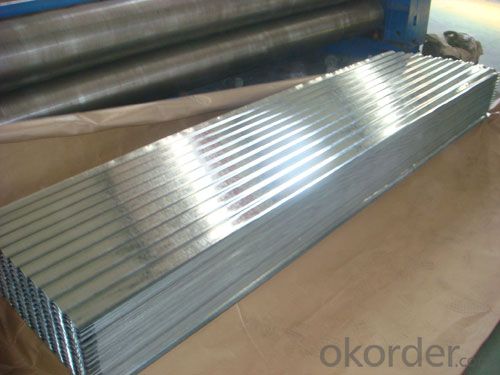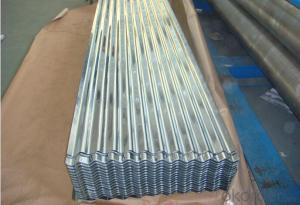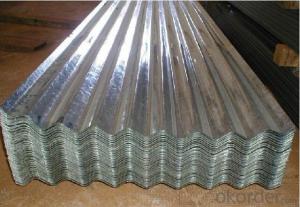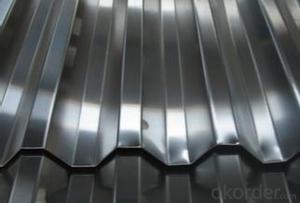Good Quality of Corrugated Galvanized Steel Sheet of China
- Loading Port:
- Tianjin
- Payment Terms:
- TT OR LC
- Min Order Qty:
- 50 m.t.
- Supply Capability:
- 5000 m.t./month
OKorder Service Pledge
OKorder Financial Service
You Might Also Like
1. Hot-Dip Galvanized Steel Roof Description:
Hot-dip galvanized steel roof are available with a pure zinc coating through the hot-dip galvanizing process. It offers the economy, strength and formability of steel combined with the corrosion resistance of zinc. The hot-dip process is the process by which steel gets coated in layers of zinc to protect against rust. It is especially useful for countless outdoor and industrial application.
2.Main Features of the Hot-Dip Galvanized Steel Roof:
• Excellent process capability
• Smooth and flat surface
• Workability, durability
• Excellent heat resistance performance
• High strength
• Good formability
• Good visual effect
3.Hot-Dip Galvanized Steel Roof Images

4.Hot-Dip Galvanized Steel Roof Specification
Material: Galvanized Sheet
Width: 650/800/890/900
Length: 1500/1800/2000/2400/3005/3600 or customized
Thickness: 0.2-2.0
Surface Treatment: Hot dipped/Bended
Application: warehouse; shelter; Commercial facilities; industrial facilities
5.FAQ of Hot-Dip Galvanized Steel Roof
Which payment term we can do?
L/C at sight or T/T.
What’s the basic material of this product?
Galvanized/Aluzinc Steel
Arial Unicode MS"'>5.FAQ of Pre-Painted Galvanized/Aluzinc Steel Roof
What’s the brand of the paint?
We use the best brand of all of the word—AKZO.
What’s the wet and heat resistance of the roof?
More than 1000 hours.
- Q:How are steel coils used in the production of construction equipment?
- Steel coils are used in the production of construction equipment as they serve as the primary raw material for manufacturing various components such as structural frames, panels, chassis, and other critical parts. These coils are unwound and processed through cutting, bending, and welding techniques to create the necessary shapes and sizes required for construction machinery. The high strength and durability of steel make it an ideal material for construction equipment, ensuring longevity and reliability in demanding job site conditions.
- Q:Does steel have a valence number and if so, what is it?
- Steel is a mixture, so it doesn't have any valence number. On the other hand, all of the components of the steel mixture are in their elemental forms, so all the various valences are zero.
- Q:How do steel coils contribute to the manufacturing of household appliances?
- Household appliances rely heavily on steel coils, which are essential for their production. These coils, crafted from high-quality steel, are vital in providing the necessary strength and durability needed for manufacturing various appliances. One key application of steel coils in household appliances is their use in constructing the appliance's body or frame. These coils are shaped and molded into the desired structure, creating a robust foundation for the appliance. This ensures that the appliance can endure daily usage and remain intact for an extended period of time. Furthermore, steel coils are also employed in manufacturing different components within household appliances. For instance, refrigerators and air conditioners utilize steel coils in their condenser and evaporator coils, which are responsible for the heat exchange process. These coils enable efficient cooling or heating, guaranteeing optimal performance of the appliance. Moreover, steel coils find application in producing appliance interiors, such as oven racks, dishwasher baskets, and laundry machine drums. The strength and resistance provided by the steel coils help these components withstand heavy loads and repeated use, enhancing the overall longevity and reliability of the appliance. Additionally, steel coils contribute to the aesthetic appeal of household appliances. They can be shaped, molded, and coated to achieve various finishes, colors, and textures, enhancing the visual attractiveness of the appliance and making it more appealing to consumers. In conclusion, steel coils are indispensable in the manufacturing of household appliances as they provide strength, durability, and resilience to the structure, components, and interiors of these appliances. They play a crucial role in ensuring the performance, reliability, and longevity of these appliances, making them an integral part of the manufacturing process.
- Q:Can steel coils be used in high-temperature applications?
- Yes, steel coils can be used in high-temperature applications. Steel has excellent heat resistance properties, and it can withstand high temperatures without undergoing significant deformation or structural damage. Additionally, steel coils are often treated with coatings or alloys to enhance their heat resistance, making them suitable for various high-temperature environments such as furnaces, boilers, and industrial ovens.
- Q:How are steel coils used in the production of steel springs?
- Steel coils are used in the production of steel springs by being cut and shaped into the desired size and shape of the spring. The coils are then heated and tempered to improve their strength and flexibility. The steel coils provide the raw material necessary for creating durable and reliable steel springs used in various applications such as automotive, furniture, and industrial machinery.
- Q:What are the different coil leveling methods used for steel coils?
- There are several coil leveling methods used for steel coils, including roller leveling, stretcher leveling, and tension leveling. Roller leveling involves passing the coil through a series of rollers to remove any curvature and create a flat surface. Stretcher leveling involves stretching the coil in different directions to remove any shape irregularities. Tension leveling applies tension to the coil during the leveling process to eliminate any residual stresses and create a uniformly flat product.
- Q:this is for a school project due morrow can u please answerwhat are disadvantages of stainless steelplease also show were u got info ty
- Disadvantages of Stainless Steel: 1. High initial cost 2. Difficult to fabricate, or in other words, it is not as malleable as other metals, say iron, and hence if not fabricated properly, results in costly re-work. 3. Difficult to weld 4. High cost of polishing etc. i.e. adding finishing touches for the market. Also, for the record: Stainless steel does NOT rust. One of the advantages of it over other metals (steel and iron) are that it is rust-free. But of course, depending on the environment condition (E.g. long periods in a rainforest without use at all) it can rust....this is a very rare (and unfortunate) situation. ;)
- Q:How are steel coils priced?
- Steel coils are priced based on various factors including the current market demand and supply, raw material costs, production and processing expenses, transportation and logistics costs, as well as any additional charges or fees imposed by the manufacturer or supplier.
- Q:I noticed a friend's appliances are not magnetic, and mine are. Both are stainless steel. Are there two types of stainless steel or something? Thanks
- Is Stainless Steel Magnetic
- Q:How are steel coils transported and stored?
- Steel coils are typically transported and stored using specialized equipment and facilities. They are commonly transported by trucks, trains, or ships, secured with steel strapping or wire rope to prevent movement during transit. Once at the storage facility, steel coils are typically stacked in a secure and organized manner, either on the ground or on specially designed racks. The coils may be stored indoors or outdoors, depending on the specific requirements and conditions. To protect the coils from damage and corrosion, appropriate weather protection measures and coatings are applied.
1. Manufacturer Overview |
|
|---|---|
| Location | |
| Year Established | |
| Annual Output Value | |
| Main Markets | |
| Company Certifications | |
2. Manufacturer Certificates |
|
|---|---|
| a) Certification Name | |
| Range | |
| Reference | |
| Validity Period | |
3. Manufacturer Capability |
|
|---|---|
| a)Trade Capacity | |
| Nearest Port | |
| Export Percentage | |
| No.of Employees in Trade Department | |
| Language Spoken: | |
| b)Factory Information | |
| Factory Size: | |
| No. of Production Lines | |
| Contract Manufacturing | |
| Product Price Range | |
Send your message to us
Good Quality of Corrugated Galvanized Steel Sheet of China
- Loading Port:
- Tianjin
- Payment Terms:
- TT OR LC
- Min Order Qty:
- 50 m.t.
- Supply Capability:
- 5000 m.t./month
OKorder Service Pledge
OKorder Financial Service
Similar products
New products
Hot products
Hot Searches
Related keywords





























